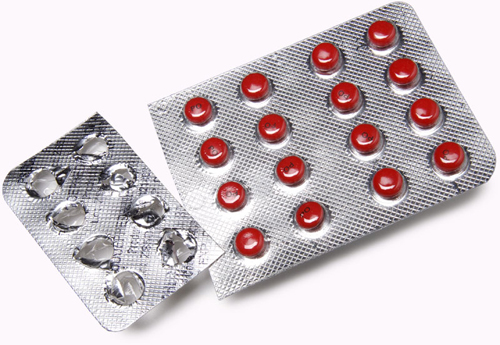| Q: |
What are the most effective over-the-counter medications to stop a migraine attack?
|
| A: |
Aspirin and other nonsteroidal anti-inflammatory drugs (NSAIDs),
such as ibuprofen and naproxen, are particularly helpful once central
sensitization has started. It is important to avoid overusing these
medications since you could develop gastrointestinal or kidney problems.
|
| Q: |
How do aspirin and the other NSAIDs work to treat a migraine attack?
|
| A: |
Aspirin and the other NSAIDs are considered a specific treatment
because they treat the process of the migraine attack, not simply the
pain of the headache. It is thought that their anti-inflammatory
properties work at the brain cell level or block chemical release at
nerve endings, preventing the inflammation and dilation of blood
vessels.
|
| Q: |
How do I know if I am taking too much aspirin or other NSAIDs for my migraine attacks?
|
| A: |
If you are using aspirin or another NSAID more than twice a week
for your attacks, then you are taking too much. Migraine attacks aborted
with any kind of therapy should not occur more than twice a week or you
can progress to chronic daily headache. It is not enough to use
abortive therapy for migraine; you must have preventive care too.
|
| Q: |
Can my child take an NSAID or aspirin for a migraine attack?
|
| A: |
Aspirin is not recommended for those under 18 because of the
potential for Reye syndrome, and acetaminophen might cause medication
overuse headache. However, children and teenagers may use other NSAIDs
for migraine attacks. Consult your doctor about the proper dose for your
child.
|
Specific over-the-counter treatment
The most effective
over-the-counter medications for aborting a migraine attack are aspirin,
ibuprofen, and naproxen sodium. These nonsteroidal anti-inflammatory
drugs (NSAIDs) block the chemical reaction in the body that produces
inflammation. Originally used to treat the inflammation and pain of
arthritis, these medications have now been found to be very helpful in
treating many illnesses, including migraine attacks. These medications
do not simply treat the pain of a migraine attack but stop the process
of the attack. If the migraine is not successfully aborted within 2
hours or less using aspirin or another NSAID, then these medications
need to be combined with specific migraine abortive therapy (either
triptans or dihydroergtamine) which is only available on prescription.
Over-the-counter NSAIDs
Safe use of NSAIDs
To avoid gastrointestinal upset, NSAIDs should be taken with food and a large glass of water.
The
overuse of NSAIDs can cause stomach problems and should be avoided if
you have medical problems associated with gastrointestinal bleeding or
ulcers, or if you are taking medications that interact with NSAIDs (ask
you doctor if you are not sure).
The
NSAIDs, apart from aspirin, can complicate high blood pressure and
heart disease; do not use these drugs without consulting your doctor.
As
with all over-the-counter medications, if you have other chronic
medical conditions you should never self-medicate with anything before
consulting your doctor.
